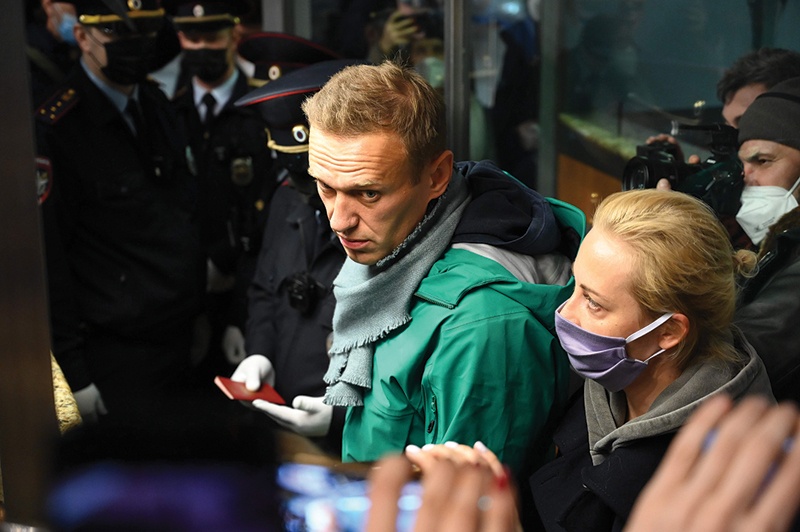 SANAA: Supporters of Yemen's Houthi movement raise firearms as they chant slogans during a demonstration in front of the closed US Embassy, in the capital Sanaa yesterday. - AFP
SANAA: Supporters of Yemen's Houthi movement raise firearms as they chant slogans during a demonstration in front of the closed US Embassy, in the capital Sanaa yesterday. - AFP
MOSCOW: Russian opposition leader Alexei Navalny said yesterday he was facing a "mockery of justice" as police in Moscow organized a makeshift court hearing a day after his dramatic airport arrest. With calls growing in the West for Navalny's release, he was brought into a courtroom set up at the police station in Khimki on the outskirts of Moscow where he was taken following his detention on Sunday night.
Aides said Navalny, who returned to Russia for the first time since being poisoned with a nerve agent in August, was denied access to his lawyers and notified at the last minute of the hearing. His team released a video of an incredulous Navalny at the hearing. "I've seen a lot of mockery of justice... but they have ripped up and thrown away" Russia's criminal code, Navalny said. "This is impossible. It's ultimate lawlessness."
Police seized the 44-year-old, the most prominent opponent of President Vladimir Putin, at a border control post at Moscow's Sheremetyevo airport less than an hour after he returned to Russia, in defiance of warnings he would be arrested. Russia's FSIN prison service said it had detained Navalny for violating the terms of a suspended sentence he was given in 2014, on fraud charges he says were politically motivated.
Navalny is also facing potential new criminal charges under a probe launched late last year by Russian investigators who say he misappropriated over $4 million worth of donations. Navalny emerged a decade ago as the leading critic of the Kremlin, with his Anti-Corruption Foundation publishing anti-graft investigations that often reveal the lavish lifestyles of the Russian elite.
'Totally incomprehensible'
He has repeatedly led large-scale street protests against Putin, most recently in the summer of 2019, and was gearing up for another challenge to authorities during elections to the lower house State Duma in September. He was evacuated to Germany after falling violently ill on a flight over Siberia in August from what Western experts eventually concluded was a poisoning with Soviet-designed nerve agent Novichok. Navalny accused Putin of ordering the attack, a claim the Kremlin vehemently denies. Russian police have not opened an investigation citing a lack of evidence.
His arrest on Sunday drew widespread Western condemnation, with the United States, European Union, France and Canada all calling for his release. Others joined that call yesterday, with EU chief Ursula von der Leyen saying Russian authorities should "immediately release him and ensure his safety". German Foreign Minister Heiko Maas said it was "totally incomprehensible" that Navalny had been arrested, while Britain's Foreign Secretary Dominic Raab condemned the detention as "appalling".
"He must be immediately released. Rather than persecuting Mr Navalny Russia should explain how a chemical weapon came to be used on Russian soil," Raab wrote on Twitter. Navalny was poisoned with the same chemical said to have been used in the attempted murder of former spy Sergei Skripal in the English town of Salisbury in 2018. Russia has hit back at the condemnation, with Foreign Minister Sergei Lavrov yesterday saying it was an attempt to distract attention from domestic problems in Western countries.
"It looks like Western politicians see this as an opportunity to divert attention from the deepest crisis the liberal development model has found itself in," he said. Russia frequently accuses the West of unfair criticism of its domestic policies pointing to divisions in Western countries like those that led to the storming of the US Capitol or the Yellow Vests protests in France. - AFP




